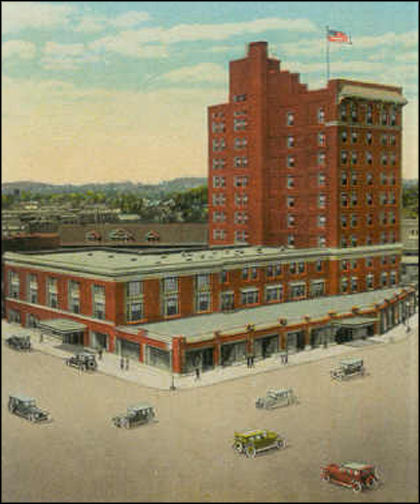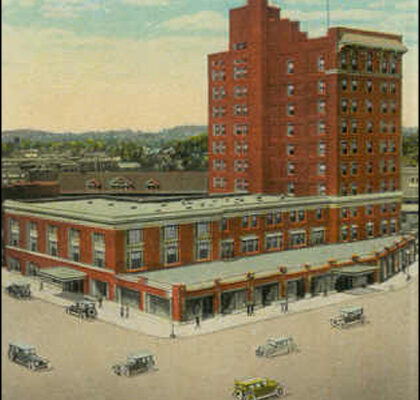In the fall of 1928, the Tennessee Hotelmen's Association held a two-day conference in Johnson City at the downtown John Sevier Hotel. Folsom B. Taylor, manager of the 10-story structure and vice-president of the state association, served as host. W.W. Westmoreland, manager of the hotel and J.M. Majors, administrator of the nearby Colonial Hotel also served as hosts.

The John Sevier Hotel as it appeared in 1923 after the first of three planned additions. The second one was built a few years later but the third (adjacent to E. Market Street) one never materialized.
The event was largely of a social nature, following business sessions held in Kingsport on Monday, with Frank B. Warner, manager of the Kingsport Inn, as planner. After arriving from Kingsport shortly before noon, the hotel men, their wives and guests, attended a luncheon at the John Sevier, where formal greetings were given on behalf of Johnson City, with responses by members of the association. A prominent part of the program was the paper on “Good Roads,” by Folsom B. Taylor, after which a general discussion occurred.
In the afternoon, a motor visit was made to Glanzstoff, Bemberg, Soldiers’ Home and other area points of interest, where members were courteously received.
Frank Shutt, of Memphis, presided as toastmaster and in addition to the scheduled numbers, bits of enjoyable side conversations were indulged by various members.
A double feature was the dancing and singing in costume of Miss Jane Douglass, who introduced “A Cabaret Specialty,” in fancy costume, singing and dancing to modern syncopated music. Also, an Oriental interpretative dance was appropriately costumed and artfully introduced. Accompaniments were by Miss Marjorie Davenport (a clerk at J.G. Sterchi Furniture Co.).
Charles J. Broyles, baritone, introduced the popular “Brown October Ale” song from “Robin Hood” and responded with a splendid rendition of “The Wanderer,” both artistic numbers approvingly received. Music throughout the evening was inspiring, rendered by a trio, Miss Mary Inah Conner, piano; Professor Kratochwill of Greeneville, violin; and Chester Edens of Elizabethton, violin/cello.
Besides members of the association, visitors introduced included J.W. Ring, a prominent figure associated with the securing and location of Bemberg and Glanzstoff; Carroll E. King and Fred W. Hoss of Appalachian Publishers. Mr. Hoss responded with an original piano selection. The singing by the John Sevier Bell Hop Male Quartet, whose well-known harmonies and musical humor were enjoyable parts of the program, producing arousing applause.
The hotel stay included an eight-course banquet in the beautiful ballroom on the final day, affording guests the pinnacle of preparation, service, variety and quantity of “their own wares.”
The ballroom was lavishly decorated with a profusion of cut flowers and smilax (a popular floral decoration in the asparagus family that has a slender vine and glossy foliage. A huge decorated cake was formally cut at the conclusion of the dinner, followed by an elaborate and varied program of entertainment.
The elaborate menu offered a variety of tasty items: Stuffed Kalamaoo Celery with Roquefort Cheese, Mixed California Olives, Salted Almonds, Chicken Consommé Julienne, En Tasse Double Shutt, Poached Halibut, Oyster Sauce, Augured Potatoes, Hot Rolls, Cranberry Punch Frozen, Roasted Stuffed Milk Feed Chicken Hawaiian, Idaho Baked Potato Spanish Style, Asparagus Tips on Toast, Drawn Butter, Tiny French Peas in Novelty Cases, Buerre Fondue, Hot Rolls, Vienna Bread, Maiden Blush Salad with Saltine Wafers, Coupe Beau Rivage, Fancy Cakes and Coffee, Mints and Cigars and Cigarettes.
The dinner in the evening was followed by a dance, in which a number of local young people joined the visitors. The hotel men, managers and officials of the largest hostelries in the state, lavishly commended the entertainment provided and especially had praise for the closing banquet, which they declared could hardly be excelled.
